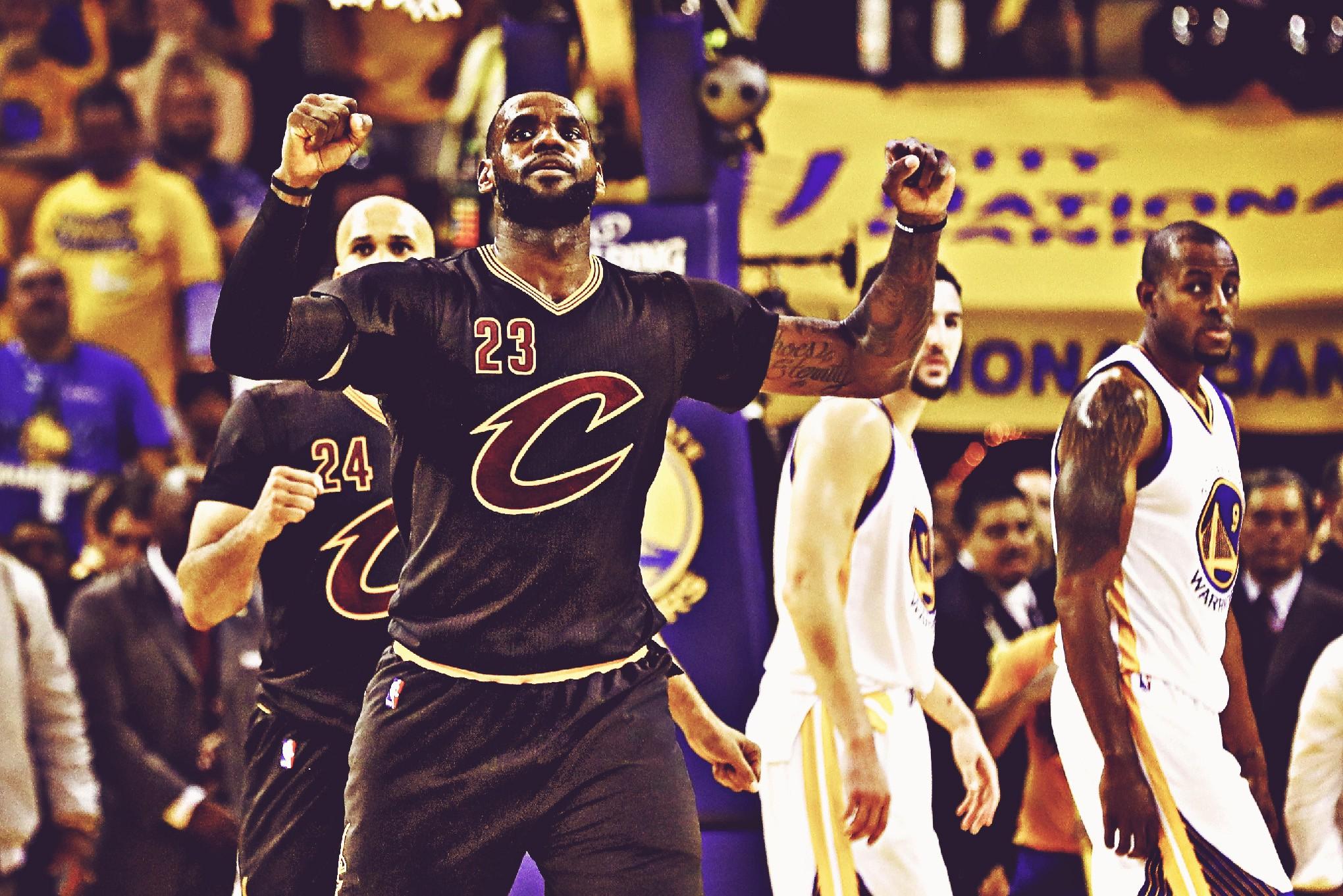Ten seconds separated moments of agony and joy. But in both of those instances, LeBron James assumed the same position: lying prone on the floor, his wrists telling the entire story.
After an aerial collision between James and Draymond Green on what would have been an iconic poster dunk, LeBron fell to the court, his right wrist snapping forward in recoil. His wrists were adorned with bands that read “I PROMISE.” The symbolism was suffocating, but the only thing about to break was Cleveland’s tortured 52-year professional sports championship drought.
Ten seconds of game time later, he collapsed on the floor again, amid a sea of cameras, audibly and uncontrollably weeping. The Cleveland Cavaliers had won their first NBA championship in franchise history.
Game 7, which the Cavs won 93–89 in Oakland, could have lasted an eternity without a single murmur of complaint; its end only seems to signal another revival. A yearly summit between the Cavs and Warriors could establish the closest thing the 21st century will have to a Larry Bird–Magic Johnson rivalry between LeBron James and Stephen Curry, but drawing that kind of parallel seems beside the point with LeBron. He has always felt out of place and time — out of this world. LeBron has never needed a contemporary, because his race is with the history of the game itself. His greatest rival is and will always be the idea of LeBron James.
Wilt Chamberlain’s battle with his own otherworldly talent was inextricably tied to Bill Russell, who served as the human face of Chamberlain’s inability to live up to an impossible standard. LeBron, for better or worse, has never had that avatar in his career. And so, as LeBron does, he took that mantle, too. James, one of the most gifted athletes in sports history, and James, the player whose failures are an affront to greatness, are housed in the same 250-pound frame. Whichever one we saw reflected on the screen has always said more about our perception than his reality.
“I’m LeBron James, from Akron, Ohio — from the inner city. I’m not even supposed to be here,” he said in 2013 after being awarded his second consecutive Finals MVP award. It was the most succinct version of a message that LeBron has repeatedly delivered. It’s a catch-all answer that can feel like deflection, but at its root, it’s James establishing the totem of his reality.
Legacies of active players are living documents. But they’re generally framed as the definitive look at a career. Since 2011, LeBron has really doubled down on letting people know that he doesn’t pay attention to what people say about him, and it’s because he will always have the final word. When LeBron reminds us where he’s from, he’s also reminding himself. Because he can’t afford to lose himself in someone else’s dream.
Green played a near-flawless offensive game, and he did his part in cutting off easy lanes for the Finals MVP, but the most pervasive nuisance to LeBron all night was the specter of what he could be. He was passive for much of the game, settling for bad shots and forcing bad passes to teammates when his first option was taken away.
Still: James was the series leader in points, rebounds, assists, steals, and blocks; he logged only the third triple-double in a Finals Game 7; his block on Andre Iguodala with under two minutes left in the game, with his arms canvassing both sides of the rim and crashing down like the flaming sword of Uriel, will stand as one of the greatest plays in playoff history. All the notions of greatness that LeBron embodies will never be enough for some, but that’s all subject to change. The Chicago Bulls capped off their 72-win season with a 12-point victory over the Seattle SuperSonics. History does not highlight Michael Jordan’s 26 percent field goal percentage or 5-for-19 showing in the final game — it highlights the milestones. It will always highlight the milestones.
Answering media questions on Saturday before Game 7, LeBron jokingly alluded to his comments last month about Curry’s MVP award win and the distinction between “most valuable” and “best,” which were seen as subtle jabs. As the Cavaliers celebrated their title win on the court, Mike Breen asked, “Has there ever been a player more valuable to his team than James has been in Cleveland the past two years?” If there was a line of demarcation before this series, LeBron has blurred it.
Under pressure, time seems to accelerate; everything is magnified. In the afterglow of a Finals victory, that distinction between “best” and “most valuable” takes on a broader context. LeBron will never be able to take away the 73 wins, or the 402 3-pointers, or the unanimous MVP selection — those milestones are undeniable — but he’s stepped out of the shadow of the Warriors colossus to force us into rethinking how we map the future and the past. (It doesn’t hurt that James’s Finals MVP honor was also unanimous.) Curry will be the player who defines this new era, but LeBron is the one who bridges the divide. Ask the gatekeepers on either end who is best. You’ll probably get the same answer.


